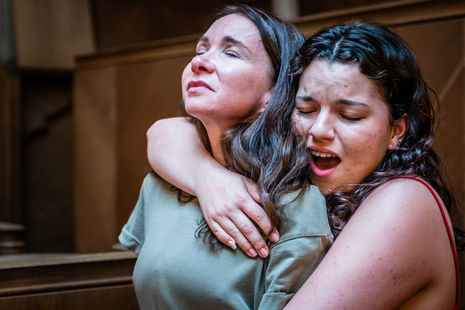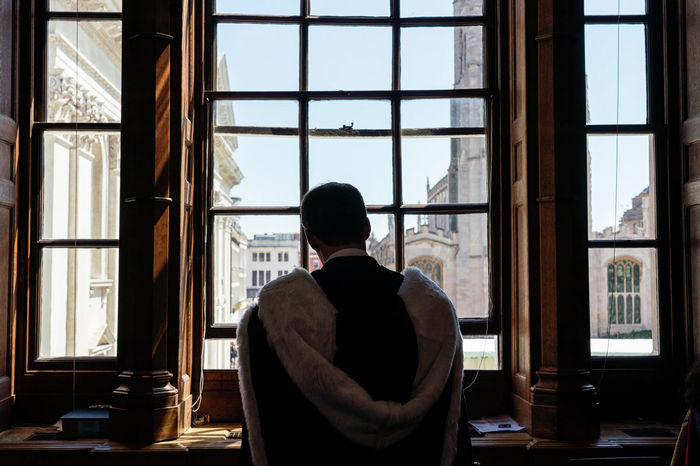gentlemen of the jury: how do we view abortion?
This bold piece of dystopian theatre provides thought-provoking material on how we choose to judge others

A play like Aisling Towl’s gentlemen of the jury exposes the fragility of the five star rating system. Typically, my criticism tends to centre on aesthetics –performances, sets, sound, lighting designs – the usual hallmarks of a Camdram production. This isn’t a critique of what is, by all accounts, a vibrant theatre scene, but it’s unusual for me to leave a play that truly challenges me to think. In many ways, gentlemen of the jury runs counter to the typical Cambridge show: not staged in a traditional theatre, featuring minimal lighting, a tightly confined setting and experienced as much through the post-show Q&A as the performance itself. And yet, it works so powerfully, as much a social experiment as it is a piece of theatre.
“And yet, it works so powerfully, as much a social experiment as it is a piece of theatre”
Set in a courtroom, the jury witnesses four women give testimony as to why they should receive an abortion. An officer of the law orchestrates this event – ‘Ladies’ Night’ – and questions each woman as they provide their accounts of how they got pregnant. While watching the play, the prevailing issue I had with its script was the lack of development it afforded both its characters and its world. Nicolas Rayment’s Officer, in particular, felt slightly unnatural, owing to abrupt shifts between authority and cliched sarcasm, coming across as a stereotyped stand-in for patriarchal injustice than a realistic human. It’s a recognisable archetype, but one I was annoyed got as much focus as it did when his dialogue was so painfully on the nose. While this was clearly a deliberate choice to foreground the more layered characterisation of the four women (which Towl writes brilliantly), the tightly constructed nature of the world unintentionally stifled any deeper curiosity I might have had surrounding its nature – the premise, unfortunately, seemed underdeveloped.
The limited rebellion the women are given – breaking into abstract convulsions under red light after each account – did little to convince me otherwise. In the Q&A session, it was suggested these moments conveyed sentiments the setting didn’t allow, despite the fact the prayer scenes had already served that role in a much more effective manner. Perhaps the intention was metaphorical, to reflect how even acts of disruption become routine (the Black Mirror episode featuring Daniel Kaluuya comes to mind), but in practice, I felt these ended up feeling more farcical rather than empathetic expressions of anguish.
“Where the play’s genius became clear was in its unexpected interactivity”
Where the play’s genius became clear was in its unexpected interactivity. We, the jury, get the chance to vote on which woman receives their ‘pardon.’ In the moment, I was quite skeptical – surely the decision was already written in the script? Hence, I decided to be a bit of a rebel, and put a cross next to every name on my ballot – a decision which I was later pleased to realise others did as well. What surprised me was when a male audience member, not a plant I have been assured, spoke up during the counting process, labelling the court a “disgrace” that lacked “any real sense of justice.” Another, a woman, spoke of not having any ‘PG’ thoughts surrounding the situation. The audience rebelled in a way the women couldn’t, and yet, the play proceeded; the ambiguity of its artifice unresolved. In that moment, the simplicity of the premise became terrifying, as we had been forced to become an active part of the play.
There are other elements to this moment which I have been asked not to mention, but they made for ample discussion in the Q&A that followed. Why had the audience been so quick to accept the status quo? What would have happened if no one voted? How did those who voted establish a hierarchy of needs, and did they feel that the abortion was ‘deserved?’ The decision to include this element was, undoubtedly, a masterstroke, and, to its credit, the play is quick to pin the blame of its ending upon the audience. We are, after all, the eponymous protagonists of the play.
Our co-stars, however, should not be ignored. Katie Gathercole, Jenny Scudamore, Harriet Haylock, and Dounia El Barhdadi each bring distinctive commitment to their roles, handling even the most challenging monologues with authenticity and distinct characterisation. Haylock naturally draws the most attention with her character’s fiery presence, but I was especially taken with Gathercole’s bright and jovial manner: her optimistic charm was keenly missed in the play’s darker moments.
gentlemen of the jury is a play to be experienced in two parts: the play itself and the thoughts and debate which rightfully accompany it. It’s another massive success for Aisling Towl, who has absolutely established herself as an incredibly versatile and inventive playwright, and one whose work I’m sure we’ll hear of again down the line. A bold piece of theatre that deserves your attention, and a hell of a way to cap off May Week. (Bye bye for now, Camdram!)
gentlemen of the jury is showing in Cambridge Guildhall between Friday 27th to Sunday 29th June at 7:30 pm.
Want to share your thoughts on this article? Send us a letter to letters@varsity.co.uk or by using this form.
 News / Judge Business School advisor resigns over Epstein and Andrew links18 February 2026
News / Judge Business School advisor resigns over Epstein and Andrew links18 February 2026 News / Gov grants £36m to Cambridge supercomputer17 February 2026
News / Gov grants £36m to Cambridge supercomputer17 February 2026 News / Union speakers condemn ‘hateful’ Katie Hopkins speech14 February 2026
News / Union speakers condemn ‘hateful’ Katie Hopkins speech14 February 2026 News / CUCA members attend Reform rally in London20 February 2026
News / CUCA members attend Reform rally in London20 February 2026 News / Right-wing billionaire Peter Thiel gives ‘antichrist’ lecture in Cambridge6 February 2026
News / Right-wing billionaire Peter Thiel gives ‘antichrist’ lecture in Cambridge6 February 2026










